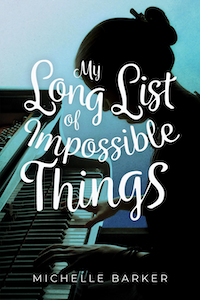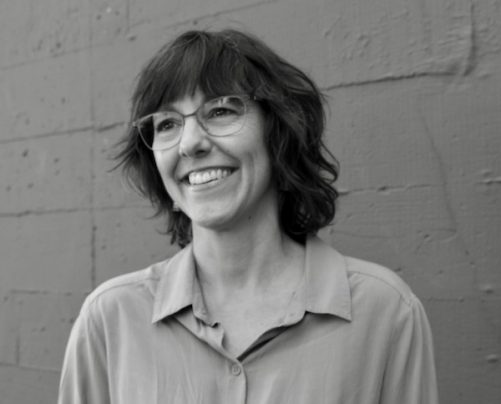Michelle Barker is a busy mother, author and career professional. As a senior editor with the Darling Axe and a prolific award-winning writer, she is always working on developing creative content that inspires readers of literary and genre-focused fiction.
Michelle lives in Canada and has a passion for nature, fitness and travel and she captures many of her adventures in her engaging blog. I’m honestly not sure how she balances it all. Still, she graciously found time in her packed schedule to share a little about a day in the life of an author, along with news of her upcoming release, ironically titled My Long List of Impossible Things.
You are an author, but what is your day job? I work as a senior editor for a manuscript development company called The Darling Axe. I love working with authors for a number of reasons. I find it rewarding to help other authors bring their manuscripts to the next level. The process is more like a mentorship than anything. I treat each job like a mini-MFA and try to teach elements of craft as part of my feedback. I also find that I learn something every time I edit a manuscript. I always have something to take back with me and apply to my own work.
Did you always want to be an author? Yes. I was one of those lucky people who knew what they wanted to do by the time they were a teenager. That said, I spent a number of years in university trying to talk myself out of it, because my parents were not fans of the idea. They wanted me to be a lawyer. So, I took a summer job at a law firm as a researcher and quickly realized that the last thing I wanted to do in my life was become a lawyer. Then I thought I’d be a professor of literature, so I started a master’s degree in comparative lit. I lasted one semester. I was in the graduate reading room writing a paper on Ibsen when I had an epiphany: I didn’t want to deconstruct Ibsen’s plays. I wanted to learn how to write like him. I quit school at the end of the term and began my career by working as a researcher and editor for a non-fiction author. And I started writing seriously.
What is your most recent book and what inspired you to write it? My most recent novel is called My Long List of Impossible Things (Annick Press, 2020). It is young adult historical fiction set in Germany just as World War  Two is coming to an end. The main Katja must find a way to rebuild her life just as she’s questioning everything she thought she knew about her country. character, Katja, is a sixteen-year-old girl whose dreams of becoming a concert pianist are shattered when the Soviets arrive in her town and kick her and her family out of their home. They embark on a journey to a faraway town where they hope to be taken in by friends, though the roads are dangerous.
Two is coming to an end. The main Katja must find a way to rebuild her life just as she’s questioning everything she thought she knew about her country. character, Katja, is a sixteen-year-old girl whose dreams of becoming a concert pianist are shattered when the Soviets arrive in her town and kick her and her family out of their home. They embark on a journey to a faraway town where they hope to be taken in by friends, though the roads are dangerous.
“The novel was inspired by my mother. She is German and grew up during World War Two, then lived for several years in what became East Germany. Though my work is not based on her life, much of it has been inspired by the struggles she faced while growing up.”
How do you hope your book uplifts those who read it? Well…Long List might not seem like an uplifting story at first glance. It was a hard book to write, and it’s hard to read in parts. But Katja is a survivor. While she goes through some tough experiences and must face some difficult truths, there is also forgiveness and unexpected kindness—and love. And there is music, and that’s something I hope will inspire readers in the same way that it uplifts the people in the novel who hear Katja play.
What are you most excited about with this book? I’m interested in the echoes that are created between the historical setting of Long List and the times we’re living in now—and there are more of them than I’d expected.
What happens when a population does not rise up and overthrow a leader who must be overthrown? How much responsibility do citizens bear for a government they elected? What is the cost of doing nothing? Those are some of the questions that reverberate through the decades.
But there are also moments in the novel that have a surprising connection to the pandemic—and I say surprising because, of course, while I was writing the novel, the pandemic was something few people could have imagined.
We study history with the benefit of hindsight, when everything looks either inevitable or obvious—why did they do this? Why didn’t they do that? How could they not have known? But when we’re in the middle of an historic event, there is no hindsight to draw on. Nothing is obvious. The inevitable is not apparent. No one knows what the right or wrong decision might be, or how long an event might last. Perhaps the biggest connection between World War Two and the times we’re living in right now is the realization that the unthinkable can happen.
How did writing a book help your business take off? Most of the editors who work at The Darling Axe are also authors, so anytime one of us publishes a book, it helps our company. And of course, the more I write, the more I learn about writing, and the more I can help others who are developing manuscripts. It all works together like a rising tide.
What advice would you give to someone wanting to succeed in your professional industry? First of all, don’t expect success to happen overnight. Writing is like any other art: it takes years of practice to learn the craft and hone your skills. Read a lot. Write a lot. Get constructive feedback from people who know more than you do.
Above all, don’t give up. Persistence is perhaps the most important quality to have in this business.
How do you handle setbacks and criticism? No one loves criticism or setbacks, but they can both be extremely helpful in forcing you to reassess your work and make it better. Feedback is essential—as long as it’s constructive and not simply designed to hurt. I also try not to take it personally. Not everyone is going to love what you do: that is a reality all artists must accept.
How do you hold yourself accountable and achieve the goals that you set forth? With numbers. Word count limits, time limits per day, deadlines—all of these are helpful in keeping me at my desk working. Yes, they’re often arbitrary, but once I set them, I do my best to meet them.
What do you find most fulfilling in the career that you’ve chosen? I love the work. I love writing, especially a first draft. I look forward to my early mornings of writing and love watching a world form word by word and page by page.
As an editor, I love getting a second draft from a writer who has worked through the feedback and applied it. Seeing the development and progression of a manuscript is so exciting to me and makes the job worthwhile.
What book uplifts you? Probably the most important novel I have ever read is All the Light We Cannot See, by Anthony Doerr. It’s an incredible achievement that took him ten years to write, and it shows. I read parts of it every day in order to learn from it.
Anything else you’d like to share with your readers? We have a writing blog on the Darling Axe website called the Chopping Blog, which is full of great advice on craft, interviews with literary agents, and success stories of authors.
I also have another young adult novel set in Germany called The House of One Thousand Eyes. It is published by Annick Press and has won numerous awards.
Image Courtesy of Michelle Barker


No comments yet.